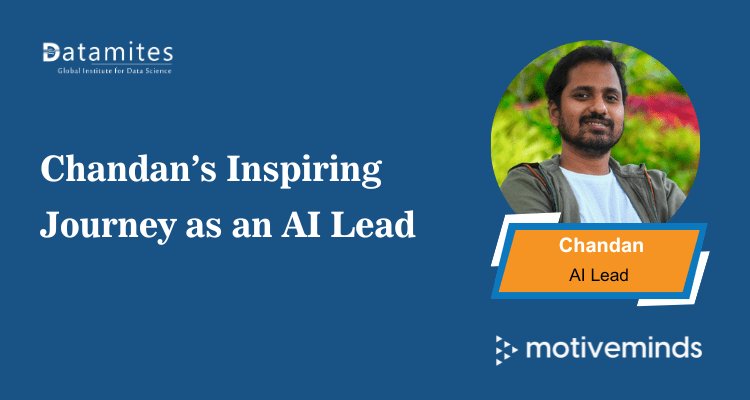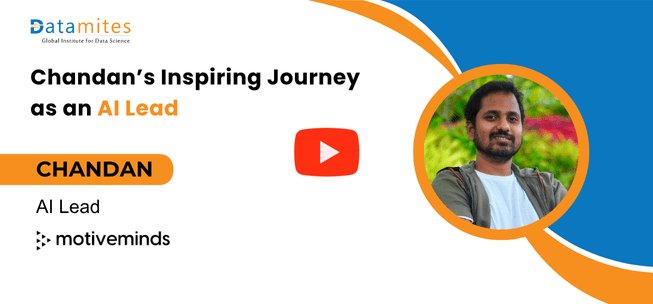From Learner to Leader: Chandan’s Inspiring Journey as an AI Lead
Chandan’s journey from a curious learner to a successful AI Lead is a testament to perseverance, continuous learning, and passion for technology.

In today’s rapidly evolving tech world, the journey from a curious learner to a visionary leader in Artificial Intelligence is nothing short of inspiring. Chandan’s story is a testament to how passion, continuous learning, and resilience can shape a remarkable career. From navigating the challenges of mastering AI concepts to leading innovative projects that drive real-world impact, his path reflects the limitless possibilities this field offers. This is more than just a career progression, it's a blueprint for aspiring AI professionals aiming to make their mark in the industry.
Interview with Chandan: His Journey to Becoming an AI Lead
In this insightful conversation, Chandan shares his inspiring path from learning AI fundamentals to leading innovative projects as an AI Lead.
Q1: Can you introduce yourself and share a brief overview of your background?
I have around 14 years of IT experience. I began my career in mainframes and later moved into Salesforce CRM, where I worked extensively. While in Salesforce, I noticed the growing importance of AI, especially with Salesforce introducing its own AI model called Einstein. That inspired me to learn AI and make it one of my core competencies. Today, I lead the Salesforce and AI practice for Moti Mines.
Q2: Were you working with AI before joining the course, or was this a passion-driven transition?
It was purely passion-driven. Many people transition to AI for better salaries or because they’re in outdated technologies. In my case, I was already in a high-paying Salesforce role. My motivation was future readiness. I saw that AI would boom in the next 3–4 years, and as a senior leader, I wanted to stay relevant.
I started learning Python on my own, but the internet was overflowing with unstructured information. After a few months of self-learning, I realized I needed a structured approach. That’s when I found DataMites, which provided professional guidance and a clear learning path.
Q3: How did you manage the challenges of learning AI while working full-time?
Time management was the toughest part. I joined the weekend batch and traveled from Whitefield to the training center spending nearly 7–8 hours in class and then doing additional work in the evenings. It was challenging, but I enjoyed it because Python was already one of my strengths.
Q4: How has AI impacted your career since completing the training?
Tremendously. I became one of the pioneers in integrating AI into Salesforce projects, especially working with the Einstein model. I also explored opportunities beyond my full-time role, collaborating with AI startups.
Q5: Why do you think AI skills are important for senior professionals?
In leadership roles, clients expect you to advise them on what’s possible with AI. Being able to discuss AI capabilities confidently not only builds trust but also opens business opportunities. Curiosity is important, but so is aligning AI solutions with real client needs. That’s where knowledge and vision intersect.
Q6: Can you tell us about your recent AI projects?
Recently, I’ve been working on two models that excite me the most. The first is an image processing model for safety compliance detecting whether field engineers are using proper safety equipment. The second is an LLM (Large Language Model) for scam and fraud detection. Both projects address real-world problems, and I believe that’s where AI has the most impact.
Q7: Many freshers want to enter AI. How should they approach companies?
The mistake many freshers make is chasing companies directly without showing relevant work. In today’s market, that approach rarely works.
Instead, you should:
- Identify current AI trends – See what companies are working on. For example, fraud detection, image recognition, digital skin and hair analysis for healthcare, etc.
- Pick a niche you’re interested in – Something that excites you and aligns with market needs.
- Build a small project – Use publicly available datasets and pre-trained AI models.
- Share your work publicly – Post on LinkedIn, GitHub, or any professional platform.
Q8: Which topics or tools from your AI training were most impactful for you?
Statistics had the biggest impact. I underestimated how crucial it is for AI. Learning how statistical concepts drive AI models changed the way I approached problems.
Python was familiar to me, but understanding the real-world application of statistics in AI was eye-opening. It shifted my perspective from just building solutions to ensuring they deliver measurable client outcomes.
Q9: How did structured learning make a difference compared to self-study?
Self-study is great for curiosity, but without a roadmap, you risk wasting time on irrelevant content. AI is vast new models like GPT-4 or LLaMA 3 keep emerging, and you can’t learn everything.
Q10: How can someone follow in your footsteps?
Start with foundational skills, find a reputable training provider, and don’t be afraid to commit time on weekends or evenings. Use your domain expertise to identify where AI can make the biggest impact in your field. Over time, you can combine your prior experience with AI knowledge to create unique career opportunities.
Refer these below articles:
- Divya’s AI/ML Journey: From Learning Python to Leading AI Projects
- From Learning to Leading: Priyanka’s Take on AI-ML Trends and Careers
- Atasi Dalal’s Journey: From Fresher to Machine Learning Developer
Here are the key findings from Chandan Journey
- Passion-driven career shift – Chandan moved into AI not for salary hikes but to stay future-ready and relevant as a leader.
- Structured learning accelerates growth – Guided training at DataMites helped him cut learning time from over a year to just a few months.
- Time management is crucial – Weekend learning and consistent practice were key to balancing a full-time job and AI studies.
- AI integration in domain expertise – Leveraged his Salesforce background to pioneer AI-powered Salesforce projects, including Einstein model applications.
- Real-world problem solving – Focused on impactful AI projects like safety compliance detection and LLM-based fraud detection.
Read these below articles:
- Agentic AI vs Generative AI: What’s the Difference?
- How Do Big Data and AI Work Together?
- What is an AI Agent? Guide to Intelligent Agents in AI
Chandan’s journey from a seasoned Salesforce expert to an AI Lead shows that transitioning into AI is not limited to those seeking a career change it’s equally vital for professionals who want to future-proof their leadership roles. His story highlights the value of passion-driven learning, the necessity of structured training over scattered self-study, and the power of combining domain expertise with AI skills.
DataMites Artificial Intelligence Institute in Hyderabad offers a comprehensive AI course with hands-on projects, expert mentorship, and strong placement support perfect for both freshers and professionals ready to upskill in the city’s thriving tech scene.
DataMites is widely recognized as a top-tier Artificial Intelligence training institute in Chennai, acknowledged by industry platforms like Analytics India Magazine along with renowned institutions like the IITs and IIMs. The program offers globally respected certifications through IABAC and NASSCOM FutureSkills, boosting learners’ credibility and helping them unlock rewarding opportunities in the growing AI job market.

